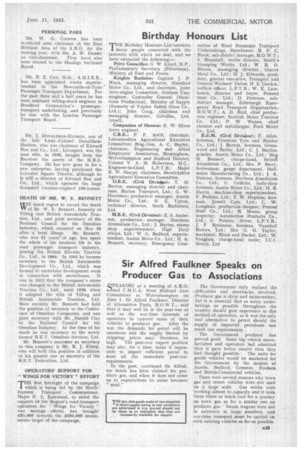Sir Alfred Faulkner Speaks on Producer Gas to Associations
Page 17

If you've noticed an error in this article please click here to report it so we can fix it.
SPEAKING at a meeting of A.R.O., and C.M.U.A. West Midland Area Committees at Wolverhampton on June 1, Sir Alfred Faulkner, Director of Alternative Fuels, M.O.W.T., said that it may well be in the post-War as well as the war-time interests of operators to convert some of their
vehicles to producer gas. After the war the demands for petrol will be enormous and the supply limited by shipping; prices may, therefore, be high. The post-war export position may also, for a time, make it impossible to import sufficient petrol to meet all the immediate post-war requirements.
In the past, continued Sir Alfred, too Much has been claimed for producer gas, and when it does not come up to expectations its name becomes " mud." The Government fully realized the difficulties and drawbacks involved. Producer gas is dirty and inconvenient, but it is essential that as many undertakings as possible throughout the country should gain experience in this method of operation, as it was the only real alternative to petrol should the supply of imported petroleum not reach our requirements.
The Government producer has proved good. Some big vehicle manufacturers and operators had admitted that it gave better results than they had thought possible. The units for goods vehicles would be marketed for the Government by the makers of Austin, Bedford, Commer, Fordson and Morris-Commercial vehicles.
There were several reasons why town as and steam vehicles were not used an a large scale Gas works were working almost to capacity and it took three times as much coal for .a journey on town gas as for a similar one on producer gas. Steam wagons were not in existence in large numbers, and war-time transport must be carried on with existing vehicles so far as possible.




















































